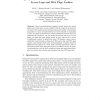Free Online Productivity Tools
i2Speak
i2Symbol
i2OCR
iTex2Img
iWeb2Print
iWeb2Shot
i2Type
iPdf2Split
iPdf2Merge
i2Bopomofo
i2Arabic
i2Style
i2Image
i2PDF
iLatex2Rtf
Sci2ools
DEXA
2008
Springer
2008
Springer
Query Recommendation Using Large-Scale Web Access Logs and Web Page Archive
Query recommendation suggests related queries for search engine users when they are not satisfied with the results of an initial input query, thus assisting users in improving search quality. Conventional approaches to query recommendation have been focused on expanding a query by terms extracted from various information sources such as a thesaurus like WordNet1 , the top ranked documents and so on. In this paper, we argue that past queries stored in query logs can be a source of additional evidence to help future users. We present a query recommendation system based on large-scale Web access logs and Web page archive, and evaluate three query recommendation strategies based on different feature spaces (i.e., noun, URL, and Web community). The experimental results show that query logs are an effective source for query recommendation, and the Web community-based and noun-based strategies can extract more related search queries than the URL-based one.
Related Content
| Added | 19 Oct 2010 |
| Updated | 19 Oct 2010 |
| Type | Conference |
| Year | 2008 |
| Where | DEXA |
| Authors | Lin Li, Shingo Otsuka, Masaru Kitsuregawa |
Comments (0)

